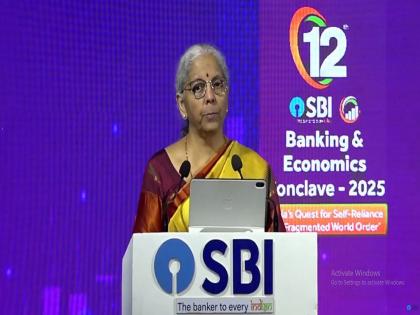Atmanirbhar Bharat is about 'resilient interdependence' not isolationism: FM Sitharaman
By ANI | Updated: November 6, 2025 23:10 IST2025-11-06T23:09:50+5:302025-11-06T23:10:02+5:30
Mumbai (Maharashtra) [India], November 6 : Union Finance Minister Nirmala Sitharaman on Thursday said that the vision of Atmanirbhar ...

Atmanirbhar Bharat is about 'resilient interdependence' not isolationism: FM Sitharaman
Mumbai (Maharashtra) [India], November 6 : Union Finance Minister Nirmala Sitharaman on Thursday said that the vision of Atmanirbhar Bharat is not "an isolationist policy" but rather "a resilient interdependence capable of meeting domestic needs while integrating with global value chains."
Speaking at the State Bank of India's conclave themed "Realising the Vision of Atmanirbhar Bharat," the minister stressed that India's self-reliance aims to strengthen domestic capacity while remaining engaged with global systems.
"It envisions an India that designs, produces and innovates for itself and for the world," she said, adding that the country's economy will be "rooted in self-confidence, powered by enterprise, and guided by compassion."
Sitharaman said Atmanirbhar Bharat rests on five broad dimensions economic self-reliance, social self-reliance (Samajik Atmanirbharta), technological self-reliance, strategic self-reliance, and environmental and energy sufficiency.
She added that these pillars are aligned with the larger goal of achieving Viksit Bharat 2047.
The minister said economic self-reliance means "the nation's ability to generate its own prosperity through diversified production, internal value chains and sustainable wealth creation."
She highlighted that India's approach would be shaped by its "own realities" and rooted in "lived-in experiences."
Sitharaman pointed out that the government's focus on infrastructure creation has been a cornerstone of this vision. "The capital expenditure allocation has increased nearly five times from Rs 2.30 lakh crore in 2013-14 to Rs 11.21 lakh crore today," she noted.
She cited improvements in infrastructure and reforms: "National highways grew by 60 per cent, from 11.6 kilometers per day in 2014 to 34 kilometers per day today. Metro rail connectivity has expanded to 23 cities with 1,000 kilometers in operation."
On trade facilitation, she said port capacity "doubled to 2,762 MMTPAs" while vessel turnaround time improved "from 93 hours to 49 hours."
Sitharaman also highlighted reforms undertaken since 2014, including the removal of "1,500 archaic laws" and "45,000 compliances," and called the GST a "next generation" reform focusing on rate reduction and process simplification.
Financial inclusion, she said, remains central to economic Atmanirbharta. "Today we have 56 crore Jan Dhan accounts, 52 lakh Mudra loan accounts, and 70 lakh PM Swanidhi loans creating a large pool of young entrepreneurs," she added.
Sitharaman said social self-reliance has empowered people who, individually, on their own, couldn't have made any difference. She emphasised a shift "from patronage-based support to irreversible empowerment and independence," adding that this approach helped lift millions out of multidimensional poverty.
"Our goal must be a society and people that stand on their own feet confident, caring and united," she said.
Listing welfare achievements, the minister said, "Four crore people have got PM Awas Yojana houses, 15 crore plus people have got tap water connections, 12 crore toilets have been built, 10 crore LPG gas cylinders have been given, and 81 crore people have got free ration."
She underlined the impact of technology and the digital public infrastructure on welfare delivery. "A total of Rs 47 lakh crore has been passed on to people through Direct Benefit Transfer since 2014," Sitharaman said, adding that this method saved the government "Rs 4.31 lakh crore."
By combining financial inclusion with technology, she said, the government ensured that welfare reached beneficiaries directly "without any pilferages," while the savings could "again go back through various other ways to the people."
Sitharaman further added that while the Viksit Bharat 2047 call may be recent, "the work towards achieving Viksit Bharat through an Atmanirbhar route had commenced even from 2014."
She said the foundational efforts made over the past decade would guide India's progress over the next two decades toward a self-reliant, empowered, and sustainable economy.
Disclaimer: This post has been auto-published from an agency feed without any modifications to the text and has not been reviewed by an editor
Open in app